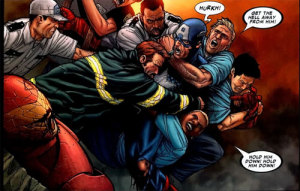With last night’s season finale of Arrow, I can now call what I believe to be the biggest season for comic book TV in history closed. Which means it’s time once again to rank the superhero/comic book shows, and take a look at who did what best.
Because it’s my blog and I do what I want.
(Gonna drop “Worst,” though, that’s less fun.)
We lost one show from last year, as Constantine went from leading his own show to only having a guest spot on Arrow (with hopefully more to come, said basically the entire internet), but gained three more as Supergirl, Jessica Jones, and the Legends of Tomorrow hit the small screen. Also, this year I’m dropping “beyond the capes” and just inviting Vertigo to the party, so we’ll throw in the improbably successful Lucifer and the sophomore season of iZombie.
(Sorry, no Walking Dead… still haven’t watched it since 2011.)
(And no Preacher. The pilot just aired, they can play next year.)
(Also I will NOT call them “Marvel’s Agents of SHIELD” or “DC’s Legends of Tomorrow,” I hate that trend, we know you’re from Marvel/DC already, there’s a better way to announce that.)
Let’s start by looking at the best characters.
Best Male Lead
This should be a harder category to judge, given how dude-heavy the superhero market is. And yet, a few male leads fell short, often through finding themselves under-written rather than a fault in the actor. These are the three who, through a blend of solid writing and great performances, pulled ahead of a crowded pack.
Bronze: Tom Ellis as Lucifer Morningstar, Lucifer (a-doy)
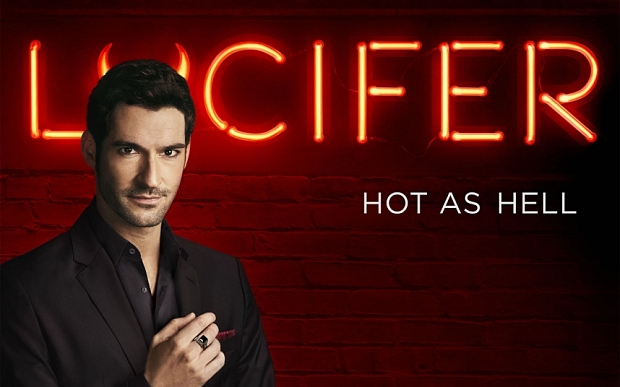
Lucifer, a series about the Devil himself living in LA and helping the police solve murders, should be awful. And yet it isn’t, thanks largely to Tom Ellis in the lead role.
There’s an undeniable charm to his take on Lucifer, and the amount of fun he’s clearly having in the role is infectious. Okay, yes, in large doses, his amused surprise voice and general lustiness can get… samey, but he still kept me coming back for an entire season of, and really listen to how ridiculous this sounds, a Castle knock-off in which the Devil helps the LAPD solve murders.
The ridiculousness of the premise bears repeating. And yet thanks to its lead, the show works. If that’s not a testament to Ellis’ skills and the writing of his character, I don’t know what is.
Silver: Grant Gustin as Barry Allen, The Flash
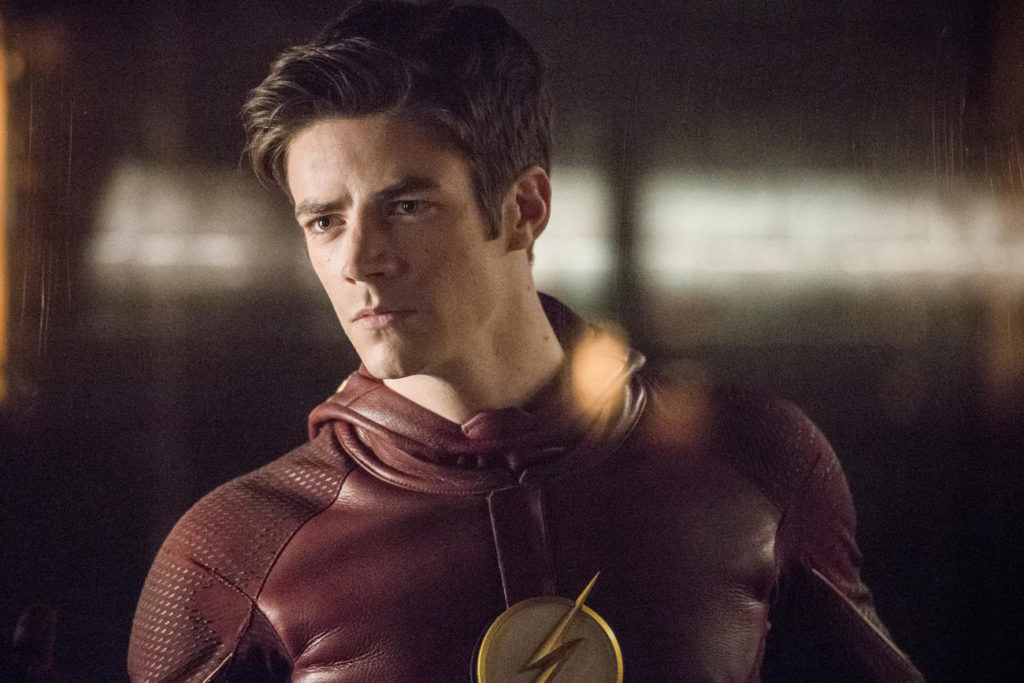
I’m surprised he slipped a spot too. It’s not Grant Gustin’s fault, Grant is still the best in the biz in many ways. Still funny and heartbreaking. Grant/Barry helped deliver two of the best episodes of other series just through dropping by to lend a hand. But in the back end of the season, Barry Allen just made so. Many. Bad. Choices. Yes, I get it, EVERY character makes bad choices, it creates drama, but it just got overwhelming. Starting in episode 10, it may as well have been called “The Increasingly Poor Decisions of Barry Allen.”
I don’t like being that angry at Barry so often. But when he wasn’t screwing up royal, he was still the most noble, most dependable, most lovable hero in a uniform. Sorry, no… in a costume.
Gold: Clark Gregg as Director Phil Coulson, Agents of SHIELD
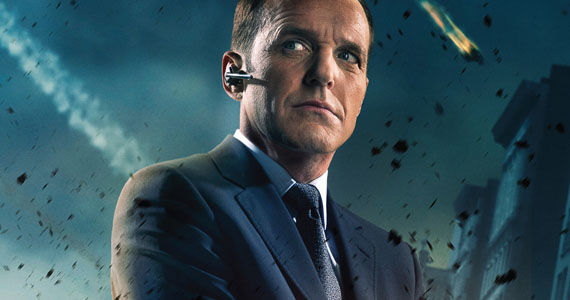
It’s like all of a sudden the writers of Agents of SHIELD remembered what an asset they have in Clark Gregg. Freed of the endless and slow-moving Tahiti/resurrection/space madness plot that dominated the first season and a half, they actually started finding more emotional and engaging things for Coulson to do. From his rivalry/flirtation with ATCU head Rosalind Price, to his unnervingly calm determination to end traitorous ex-agent Grant Ward, to how haunted he was by succeeding in it, to his awkward mismatched-buddy cop partnership with former nemesis General Talbot, Coulson had a lot of great levels and moments this year. And without all of that “Why is he alive” and “What is he hiding from the team” malarkey, he really came into focus as a leader.
This was the most fun Coulson’s been to watch since The Avengers, and it made this the season I remembered why I was glad he didn’t stay dead.
Best Female Lead
What a difference a year makes. From having so few female leads on TV that I had to stretch the definition just to have the category, to having enough that last year’s winners got knocked clean off the podium. Here are comic book TV’s top ladies.
Bronze: Rose McIver as Liv Moore (GET IT?), iZombie
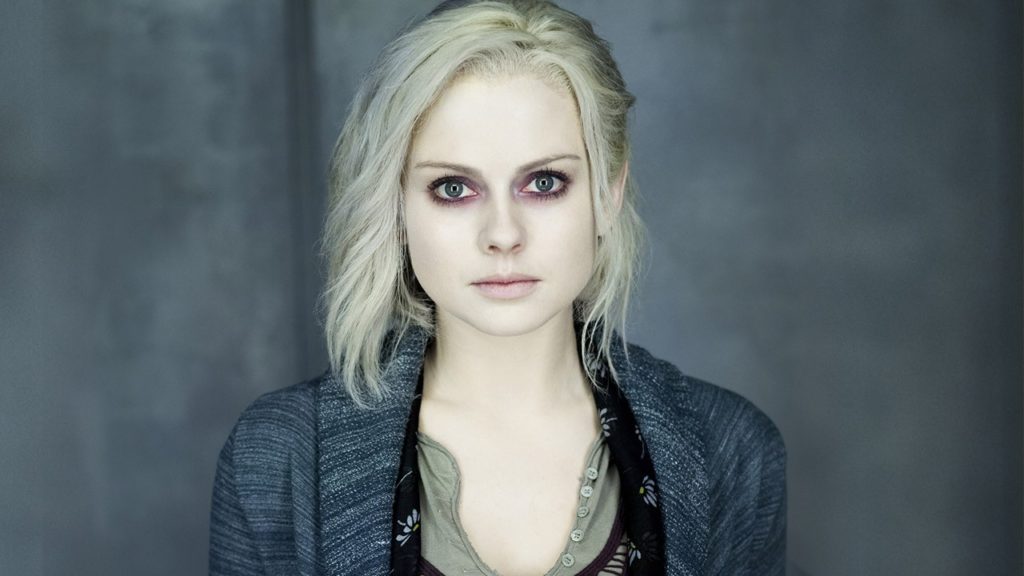
Frankly last year I did “Beyond the capes” because I wanted to rave about Rose McIver’s performance on iZombie. When zombies on iZombie eat a brain, they take on aspects of the former owner’s personality. Which means every week we meet a new twist on Liv Moore: eternal optimist, magician, fighty stripper, caped superhero, and somehow they all stay Liv at their core. This year Liv found love, lost love, and lost hope as a promised cure to zombieism began to fail, and along the way Rose McIver will make you laugh and make your heart bleed for the pale mortician with a hunger for brains.
Silver: Melissa Benoist as Kara Danvers/Zor-El, Supergirl
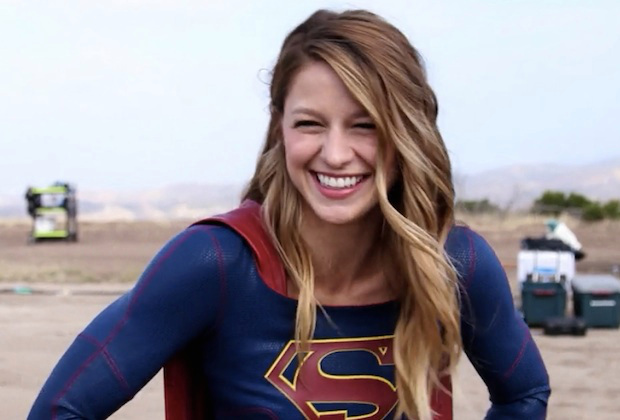
Supergirl was a breath of fresh air for people tired of the darker tone of DC’s movies. Or, indeed, some of their TV. She’s bright, smiling, hopeful, colourful, and at the heart of the character is a ridiculously adorable performance from Melissa Benoist. When she smiles, you smile, and when she cries, you cry. It’s a knockout performance as a lovable character that could only be surpassed by, as it turns out, one thing…
Gold: Kristen Ritter as Jessica Jones, Jessica Jones (I reiterate… a-doy)
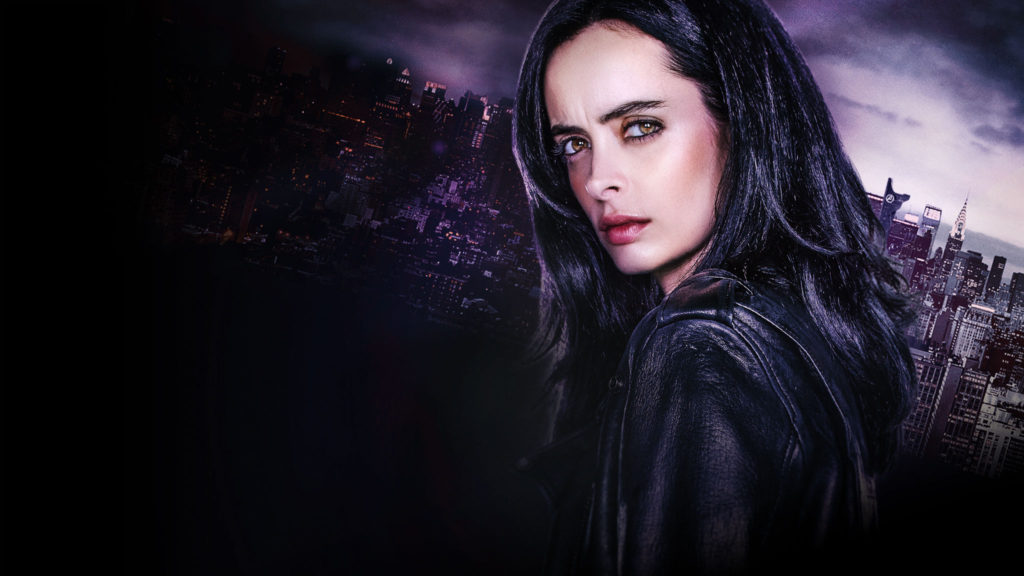
…a knockout performance as a wonderfully UNlovable character that you end up liking all the same. Jessica Jones is hard-drinking, angry, confrontational, violent, and wonderful to watch. She is a great example of what someone more knowledgeable than me on feminist lead characters discussed in an article called “The Importance of the Unlikable Heroine.” For those who didn’t read, a) for shame, b) she talks about how female characters, unlike their male counterparts, are forced into boxes of likeable, ladylike behaviour. I could go on, but this would get long and stop being about Jessica, so… like her or not, you rooted for her. She was compelling to watch, and the first hero of any gender to turn surviving sexual assault into a super power.
There’s room on TV for Supergirl and Jessica Jones, but if forced to pick (and I guess technically I wasn’t but here we are anyway), Jessica has the edge. If only for how she nailed her line when accused of being paranoid… “Everyone keeps saying that. It’s like a conspiracy.” Black Widow wishes she did that well with the same set-up.
Best Male Supporting Character
There are too many great supporting characters on TV to limit them to just one category this year. Most of these shows are made by their ensembles. Flash wouldn’t be Flash without the geeky enthusiasm and wit of Cisco, Arrow finally clicked in its first season when Oliver partnered with Diggle, Karen Page remains the beating heart of Daredevil… It’ll be hard enough just to pick out three of each gender. But let’s give it a try, starting with the dudes.
Bronze: Rahul Kohli as Dr. Ravi Chakrabarti, iZombie

As strong a lead as Rose McIver is, the heart and soul of iZombie is her partner/boss and confidant, Ravi Chakrabarti. Ravi provides backup at the morgue, searches tirelessly for a cure to zombieism, and is a best friend to Liv’s ex-fiance Major Lillywhite (yeah, I know, this show does like to be blunt with the naming). He’s also charming and effortlessly funny, such as when a barista tells him a quote is from Ghandi, and he points to himself saying “Clearly I know who Ghandi is. I’m British. He stole the crown jewel of our empire!” And he managed to sum up me watching any episode of Hannibal… after Liv whipped up that week’s brain-based meal, he leaned over her shoulder and let out a whimper of “God help me but that looks delicious…” And hey, a positive and non-stereotypical role for an Indian. And Aziz Ansari didn’t even have to write it himself.
Silver: Wentworth Miller as Leonard Snart, Flash/Legends of Tomorrow
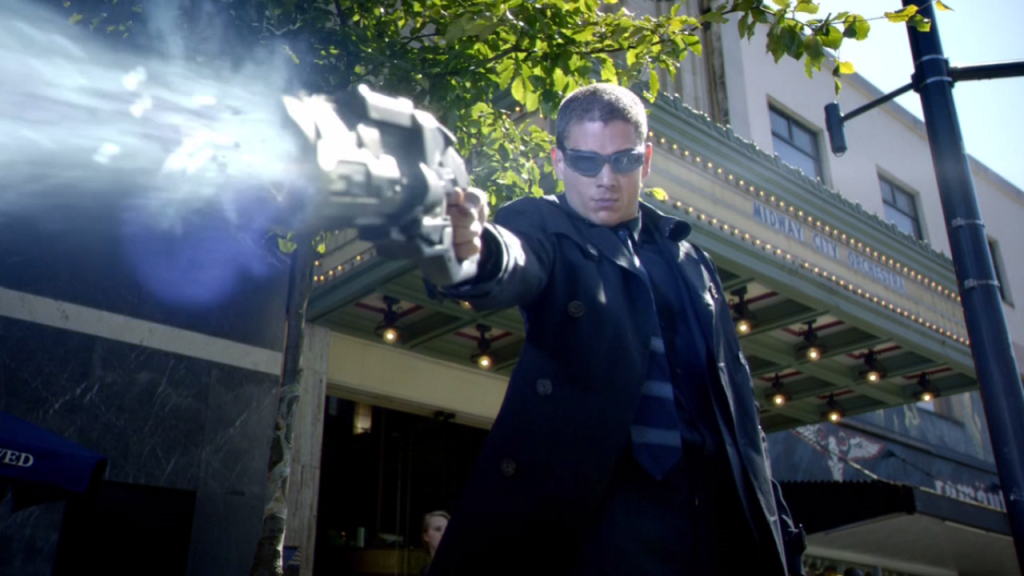
Last year, Captain Cold had knocked it out of the park as the Flash’s second best villain (not entirely fair, he had four episodes to Reverse Flash’s entire season). Not only a delight to watch, he posed an actual challenge to the Flash, beating him three out of four times they crossed paths. So it’s no surprise he made the list of “great recurring characters we want to have their own show” that is the cast of Legends of Tomorrow. What I wouldn’t have necessarily guessed, given that his team includes Brandon Routh’s Ray Palmer, Victor Garber’s Martin Stein, and Arthur Darville back in a time machine, is that he’d become the show’s MVP. Just the right level of camp, and one of the best character arcs, as Snart goes from being out to steal across history to becoming a true believer in the mission… while his long-time partner Heat Wave did not, leading to a difficult choice. As much as I’d love to see Captain Cold back in Central City leading the Rogues, I’d be sad to see him leave the Waverider. But as it turns out, next year he’ll be doing both. Or neither. It’s really uncertain right now. I just know he’ll be around somehow.
Gold: Jon Bernthal as Frank Castle, Daredevil
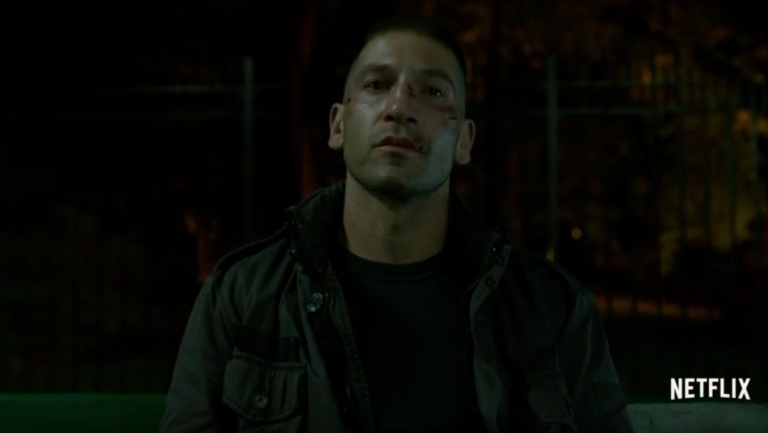
In one of the best scenes of Daredevil’s second season, in fact, of superhero TV this year, the main character just sits quietly for like five minutes while someone else gives a monologue. That’s all it took to deliver an amazing scene. Because that’s how good the Punisher was.
Jon Bernthal’s magnetic performance as Frank Castle was the single best thing about Daredevil’s second season. Frankly (sorry, that was an accident) it was one of the best things on TV this season. Daredevil had some faults this year, no getting around it, but the rise of the Punisher wasn’t one of them. No wonder he’s getting his own show, he basically stole this one out from under its lead.
Best Female Supporting Character
Remember that thing I said about ensembles? That again, only now we’re talking about women.
Bronze: Chloe Bennet as Daisy Johnson, Agents of SHIELD
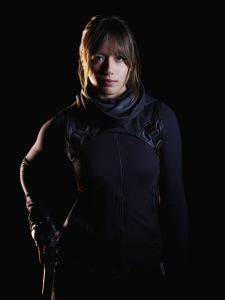
This wasn’t a sure thing until a few weeks ago. Daisy, formerly known as Skye, soon to be known by her comic alias of Quake, has always been a central figure to Agents of SHIELD, even in the beginning when she wasn’t quite up to it. But season three wasn’t just when they figured out how to use Coulson. Daisy/Chloe finally found her niche, became a badass, and as the resident Inhuman in SHIELD, the voice of her people. But it was the final episodes of the season where she really shone. After having her mind influenced by would-be Inhuman messiah Hive, Daisy finds the belonging she’s always craved… but when her mind is freed, all she’s left with is a horrible slurry of PTSD, withdrawal, guilt for her actions, and crushing grief. And when she finds out she can never get that belonging back… powerful, powerful rage. And Chloe Bennet just nailed it, leading to an amazing fight scene blending some of the show’s better choreo and Daisy’s powers.
Silver: Chyler Leigh as Alex Danvers, Supergirl
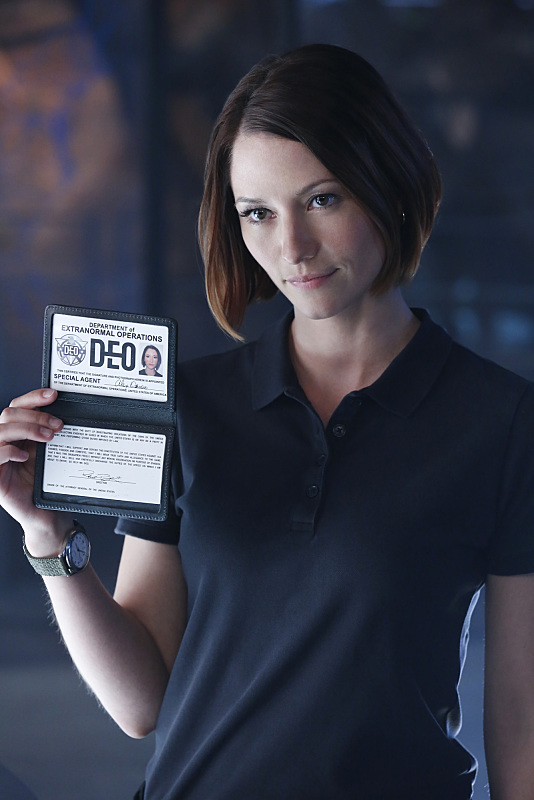
Kara may rely on her friends to help with her crime fighting, but the one person she counts on above all is her adoptive sister Alex. The love these two sisters-by-choice have powers the show more than any other relationship. Also, Alex kicks a certain amount of ass. And I’ve been a fan of Chyler Leigh’s since she and Captain America made fun of teen movies back in 2001.
Gold: Rachael Taylor as Trish Walker, “Jessica Jones”
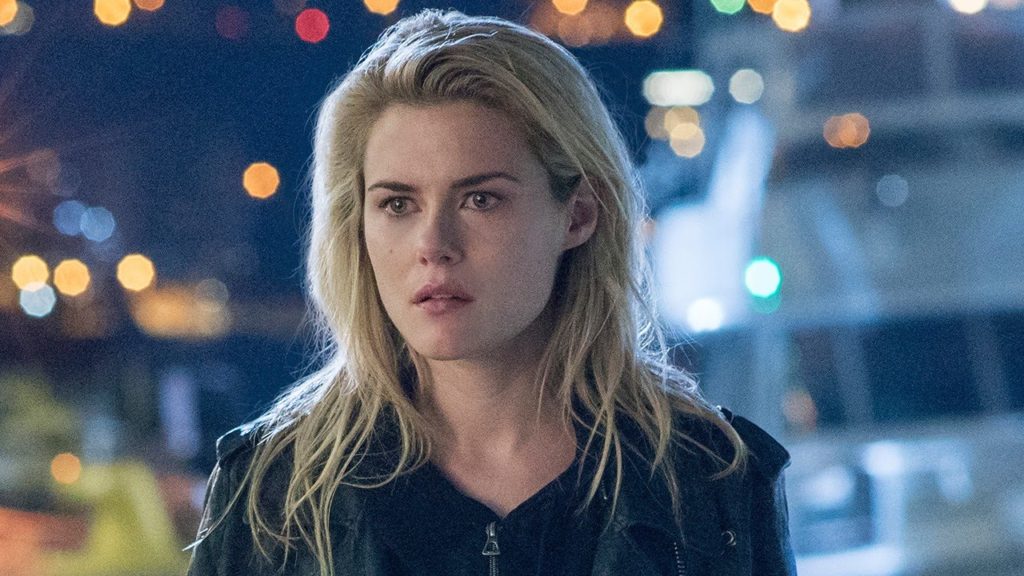
Speaking of sisters-by-choice… Jessica Jones makes every effort possible to shove everyone in her life away from her, but there’s one person who will not budge. Patricia “Trish” Walker, radio personality and former child star of “It’s Patsy,” stands by Jessica no matter what. One could argue that every positive impulse Jessica has is thanks to her friendship with Trish, who Rachael Taylor sells as a friend worth having, no matter what. And as a badass-in-progress. Even when trying to lure out Jessica’s mind-controlling nemesis almost gets her killed, Trish stays in the fight, and remains Jessica’s lifeline until the very end.
Best Villain
So, this is where I got some flak last year for naming Gotham’s Oswald Cobblepot and Agents of SHIELD’s Calvin Zabo instead of Vincent D’Onofrio’s excellent take on Wilson Fisk (Reverse Flash I stand behind). That’s on me, that’s my bad. Let’s see if I can do better this year. It’ll be a challenge, since this season saw a lot of great comic book villains hit the screen… Vandal Savage, Maxwell Lord, Killer Frost, Mr. Freeze… but these three stood out.
(Honourable mention to Agents of SHIELD’s Brett Dalton, who, as always, basically played two characters this year, both villains, one almost good enough for the podium. Six variations on Grant Ward in three seasons, at least three of them decent, that’s a little impressive.)
Bronze: Eddie Jemison as Stacy Boss/Steven Weber as Vaughn Du Clark, iZombie
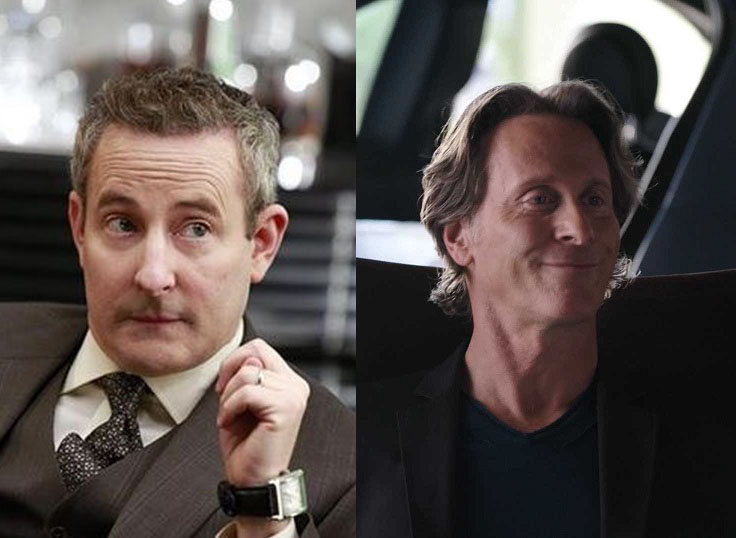
In season one, the big villain of iZombie was Blaine, formerly a low-level dealer of a drug called utopium, who infected Liv at the fateful boat party that began the zombie plague. But Blaine was too fun to kill off, and couldn’t be the main villain forever. So season two made Blaine a more necessary evil, and gave us larger roles for two of Seattle’s more nefarious businessmen. Each with their own connection to the cocktail that created zombies: a tainted batch of utopium combined with Max Rager energy drink.
Season one introduced Max Rager, its apparent connection to the zombie outbreak, and its possibly psychotic CEO, Vaughn Du Clark. In season two, Vaughn stepped up from simply pushing a product that caused outbursts of zombie-like rage in certain customers (and hiring an assassin to cover that up) to full-on supervillainy, running a secret lab studying zombies, all for the goal of successfully launching his new product Super Max, which was somewhere between Red Bull and Super Solider Serum. And he also lured one of Liv’s allies into hunting down Seattle’s zombie population to cover his tracks. Steven Weber is gleefully amoral in the role, relishing his devious acts, making Vaughn Du Clark one of those villains you love to hate.
And in this corner… season one dropped rumours and allegations about Blaine’s old employer, the kingpin of Seattle’s utopium trade, Mr. Boss (as I’ve said, they love their on-the-nose names). Season two had Liv’s best friend and Seattle ADA Peyton Charles begin putting together a case against Mr. Boss. Soon after, an unassuming man at a barber shop, played by Ocean’s 11’s Eddie Jemison, described a perfect murder that would send chills up your spine, and then later in the episode, strolled into Peyton’s office to update her board laying out Boss’ syndicate. And so did we meet Stacy Boss: mild-mannered accountant-slash-ruthless crime lord, past and future problem for Blaine’s brewing rival drug empire. Stacy Boss is a subtler, but no less dangerous evil than Vaughn, and in his own way is more monster than the zombies.
They’re both a delight, and add new layers of long-term villainy to what is still primarily a murder-of-the-week show.
Silver: Neal McDonough as Damien Darhk, Arrow
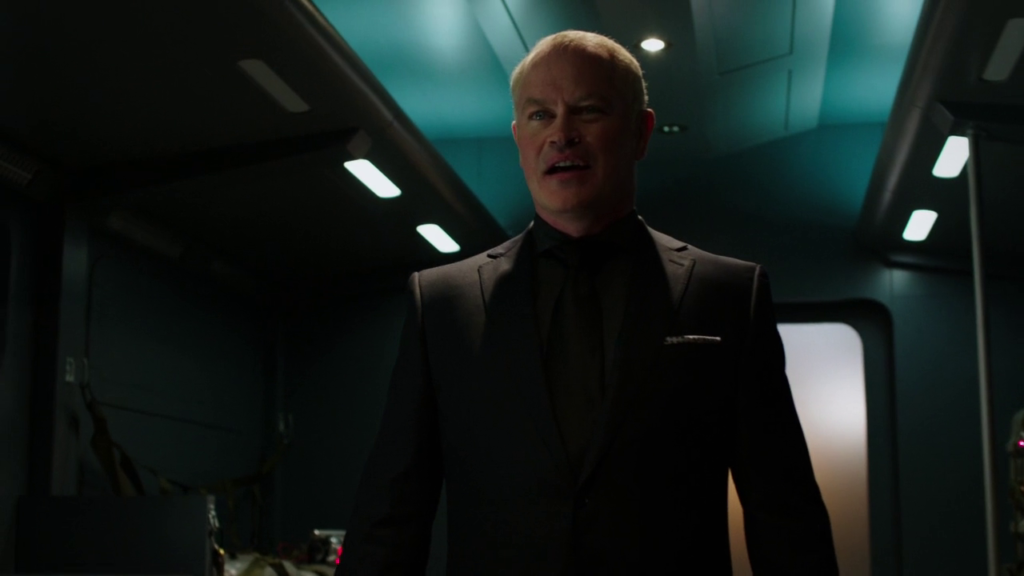
Speaking of villains you love to hate.
Last year, Arrow got to use one of DC’s big guns as their Big Bad: Batman nemesis and leader of the League of Assassins, Ra’s Al Ghul. And they whiffed it a little. This year they went the opposite direction, a villain that even I couldn’t place when he was first name-dropped at the end of season three. I probably have every comic that Damien Darhk ever appeared in somewhere in my basement, but I still had to Google him.
And they nailed it.
The sheer glee Damien had in his sinister work radiated out of him. After three years of increasingly angry and/or angsty main villains on Arrow, to have a villain who so relished the role was a breath of fresh air. And more importantly, they had Neal McDonough. He owned every scene he appeared in, no matter which show. So much so that he caused problems for one of the other DCW series villains… comic book A-lister Vandal Savage’s debut in the Flash/Arrow crossover was completely overshadowed by a one-scene cameo by Damien Darhk. Early in the season, I would actually flinch a little when Damien turned up unexpectedly, because he managed to exude that level of grinning menace just by walking into a room.
Neal McDonough gave a masterful turn as a villain we loved to hate. What could be better? Well…
Gold: David Tennant as Kilgrave, Jessica Jones
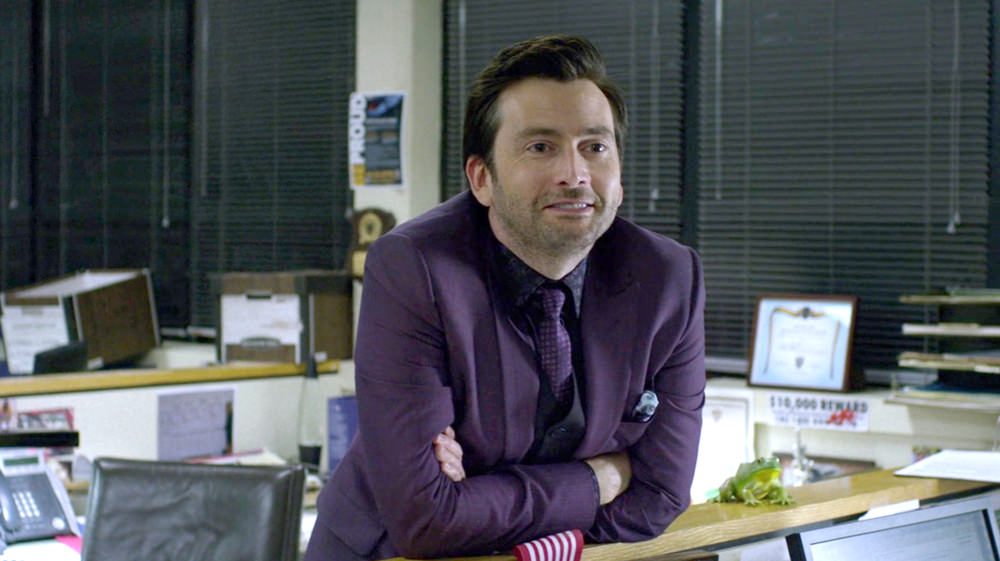
…A masterful turn as the villain we hate to love. The one who makes your skin crawl.
Oh man. Kilgrave. I knew, I knew from the second I heard who was cast, that Kilgrave would give us all the jibblies pretty hard. But I think I may have still underestimated it. David Tennant was horrifyingly spellbinding in the role. And how good was Kilgrave as a villain? He was able to create high stakes without putting the world at risk. Kilgrave didn’t want to destroy and/or rule the world, unlike the majority of this year’s Big Bads (six out of eleven, maybe seven, it’s hard to be sure with the Hand). He just wanted to make Jessica love him. But he was power without conscience, an immoral monster able to impose his will on anyone, and that was enough to make him a menace. Plus, thanks to a non-cheery Cracked article, I learned how incredibly effective he was as a powers-as-metaphor representation of abusive relationships and stalkers. Kilgrave rivals Wilson Fisk for Best Marvel Cinematic Universe villain ever, and he was head-and-shoulders above the pack on TV last year.
Next time… fights, stories, and tears.

